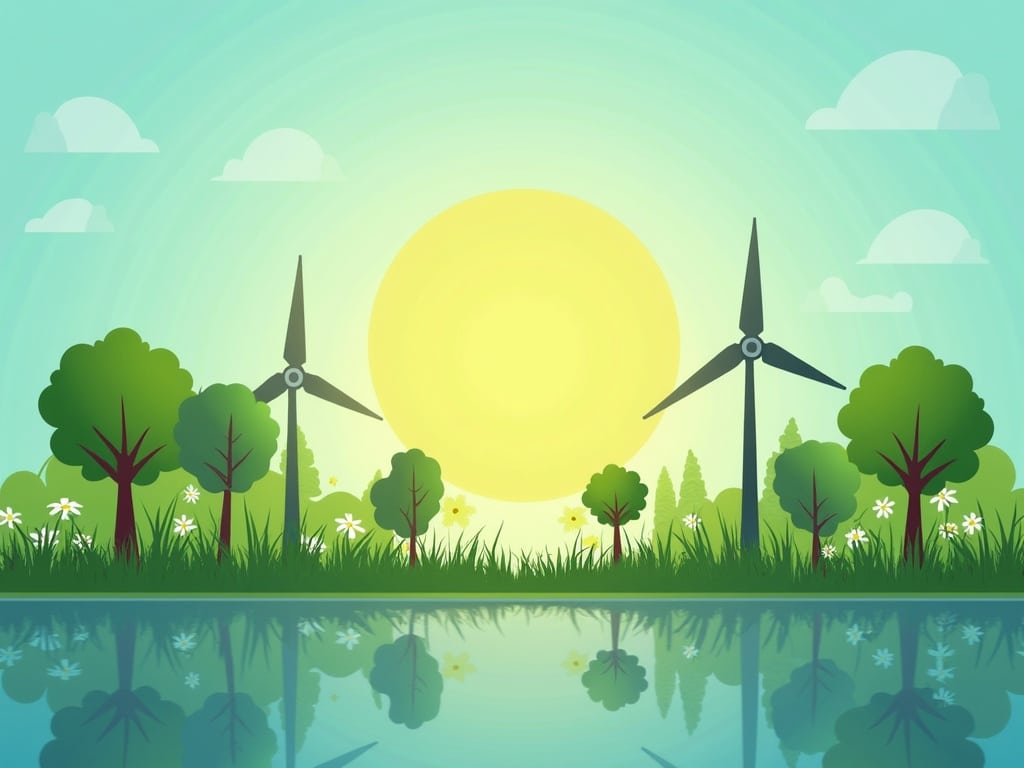Unlocking a Greener Future: The Compelling Benefits of Switching to Green Energy
Imagine a world powered by the sun, wind, and earth. A world where the air is cleaner, the planet healthier, and your energy bills more predictable. This isn’t a utopian fantasy; it’s the reality we can build by embracing green energy. Switching to green energy isn’t just a trend; it’s a powerful choice with profound benefits for you, your community, and the planet. But what exactly are these benefits, and how can you make the switch? Let’s delve into the compelling reasons to power your life with renewables.
What Exactly IS Green Energy?
Before we dive into the advantages, let’s define what we mean by green energy. Green energy, also known as renewable energy, comes from natural sources that replenish themselves. Unlike fossil fuels like coal, oil, and natural gas, which are finite, these sources are virtually inexhaustible. The most common types of green energy include:
- Solar Power: Harnessing the sun’s energy using photovoltaic (PV) cells.
- Wind Power: Converting wind energy into electricity using wind turbines.
- Hydropower: Using the energy of moving water to generate electricity.
- Geothermal Energy: Tapping into the Earth’s internal heat for heating and electricity.
- Biomass Energy: Burning organic matter, like wood or crops, for heat and electricity (though the greenness of biomass is debated depending on sourcing).
These renewable resources offer a clean alternative to traditional energy sources, minimizing our environmental impact and paving the way for a more sustainable future. Switching to these renewable sources offers numerous benefits.
Environmental Benefits: Breathe Easier, Live Healthier
The most significant advantage of green energy is its positive impact on the environment. Traditional fossil fuels are major contributors to air and water pollution and greenhouse gas emissions, the primary driver of climate change. Green energy offers a clean alternative:
Reduced Greenhouse Gas Emissions
Burning fossil fuels releases harmful greenhouse gases like carbon dioxide (CO2), methane (CH4), and nitrous oxide (N2O) into the atmosphere. These gases trap heat, leading to global warming and its associated consequences: rising sea levels, extreme weather events, and disruptions to ecosystems. Green energy sources produce little to no greenhouse gas emissions during operation, helping to mitigate climate change.
By decreasing our reliance on fossil fuels, we can reduce the amount of harmful pollutants released into the atmosphere. Renewable energy technologies like solar and wind power generate electricity without producing harmful emissions, improving air quality.
Improved Air and Water Quality
Fossil fuel power plants release pollutants like sulfur dioxide (SO2), nitrogen oxides (NOx), and particulate matter into the air, contributing to respiratory problems, acid rain, and smog. Coal mining and oil drilling can contaminate water sources, harming aquatic life and human health. Green energy sources like solar, wind, and geothermal produce minimal air and water pollution, promoting cleaner air and healthier ecosystems.
Conservation of Natural Resources
Extracting and transporting fossil fuels can have devastating impacts on the environment. Coal mining destroys habitats, oil spills pollute oceans, and natural gas pipelines disrupt ecosystems. Green energy sources utilize readily available renewable resources, reducing the need for destructive extraction practices and conserving our planet’s precious natural resources.
Economic Benefits: Saving Money and Creating Jobs
Beyond its environmental advantages, green energy offers numerous economic benefits. From lowering energy bills to creating new jobs, renewable energy is powering a more sustainable and prosperous economy.
Lower Energy Bills
While the initial investment in green energy technologies like solar panels can seem daunting, the long-term savings can be significant. Once installed, renewable energy systems generate electricity at little to no cost, reducing or even eliminating your reliance on expensive grid-based electricity. Many homeowners with solar panels even generate excess electricity, which they can sell back to the grid, earning credits on their utility bills.
Energy Independence and Security
Relying on fossil fuels makes countries vulnerable to price fluctuations and supply disruptions. Green energy sources are locally available and less susceptible to geopolitical instability. By investing in renewable energy, countries can enhance their energy independence and security, creating a more stable and resilient energy future.
Job Creation and Economic Growth
The green energy sector is a rapidly growing industry, creating numerous jobs in manufacturing, installation, maintenance, and research. Investing in renewable energy stimulates economic growth, attracts new businesses, and fosters innovation. States and countries that have embraced green energy have seen significant job growth and economic diversification.
Social Benefits: Building a Healthier and More Equitable Future
The benefits of switching to green energy extend beyond the environment and the economy, impacting society in profound ways. From improved public health to increased energy access, renewable energy is contributing to a more just and equitable future.
Improved Public Health
The air and water pollution associated with fossil fuels can have serious consequences for public health, contributing to respiratory illnesses, cardiovascular disease, and cancer. Green energy sources produce minimal pollution, leading to cleaner air and water, and improving public health outcomes.
Increased Energy Access
In many developing countries, access to electricity is limited, hindering economic development and social progress. Green energy technologies like solar home systems and microgrids offer a cost-effective and sustainable way to provide electricity to remote and underserved communities, improving access to education, healthcare, and economic opportunities.
Community Empowerment
Green energy projects can empower communities by providing local jobs, generating revenue, and increasing energy independence. Community-owned renewable energy projects can foster a sense of ownership and control, strengthening local economies and promoting social cohesion.
Making the Switch: How to Embrace Green Energy
Switching to green energy is easier than you might think. Here are some practical steps you can take to reduce your carbon footprint and embrace renewable energy:
- Install Solar Panels: Solar panels are a great way to generate your own electricity and reduce your reliance on the grid.
- Purchase Green Energy from Your Utility: Many utility companies offer green energy programs that allow you to purchase electricity from renewable sources.
- Invest in Energy Efficiency: Reducing your energy consumption is just as important as switching to green energy. Insulate your home, upgrade to energy-efficient appliances, and use LED lighting.
- Support Green Energy Policies: Advocate for policies that promote renewable energy and discourage fossil fuels.
- Consider a Green Energy Supplier: In deregulated energy markets, you can choose a supplier that sources its electricity from renewable sources.
The Future is Green: A Call to Action
Switching to green energy is not just a responsible choice; it’s an investment in a healthier, more sustainable, and prosperous future. By embracing renewable energy, we can reduce our environmental impact, boost our economies, and improve the lives of people around the world. The transition to a green energy future is underway, and every individual, business, and government has a role to play. Let’s work together to unlock the full potential of green energy and create a brighter future for generations to come.

